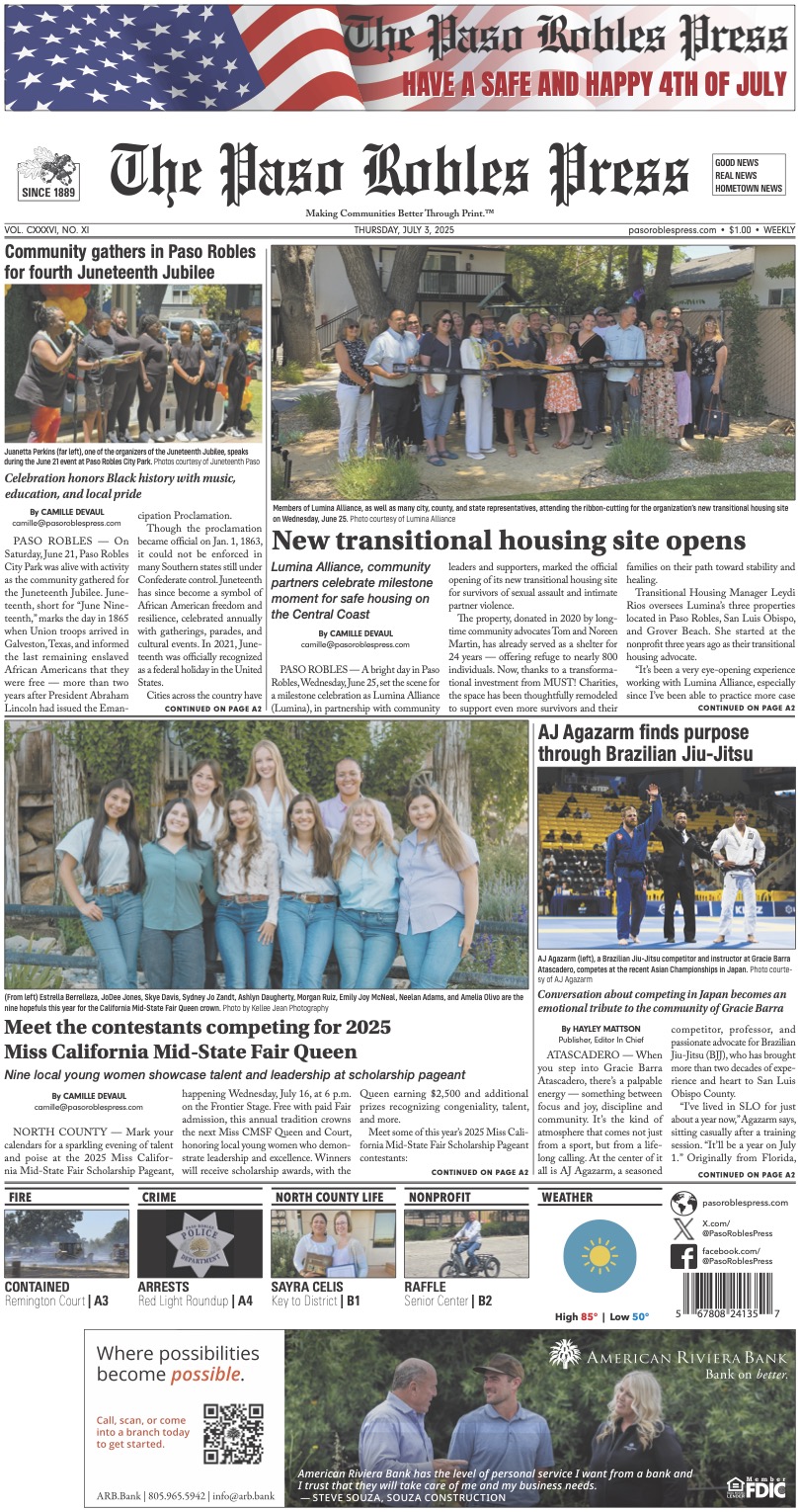Also, Council approves interim parquet policy
The first Paso Robles City Council meeting of the month virtually took place late on Tuesday, June 2, after a delay from peaceful protests in Downtown Paso Robles.
Paso Robles Police Chief Ty Lewis used part of the council meeting to address the Black Lives Matter protest and march on June 2 in Downtown Paso Robles.
The Paso Robles Police Department was notified, Lewis said, by the public who forwarded social media information of possible anti-protestors coming to Paso Robles.
Lewis immediately contacted San Luis Obispo County Sheriff Ian Parkinson and the San Luis Obispo County Police Department.
“We quickly put together a plan to ensure the safety of the protestors as well as our community. Keeping in mind everybody’s first amendment rights to speak,” said Lewis.
The local protest began around 11 a.m. and ended around 5 p.m. No buses with anti-protesters came to town.
“I have to take a moment to just really speak to the character of our community,” Lewis said. “It was outstanding to see the public respond in such a positive manner. Not only the protesters that did their best even though it was a highly emotionally charged situation — all the way to our worried community members.”
Lewis said he spoke with protesters about their frustrations of the events happening across the country involving law enforcement. Lewis promised the protesting group he would reiterate to the council the importance of addressing these difficult topics.
Paso Robles Mayor Steven Martin said he spoke with protesters and proposed creating a mayor’s panel regarding racism in Paso Robles to initiate a community conversation on the issues.
In regards to the current COVID-19 situation in SLO County, there have been seven new cases from June 1 to June 2, bringing the total of confirmed cases in SLO county to 278 with 13 active cases. North County still has the most confirmed COVID-19 cases in the county.
The COVID-19 testing sight at the Veterans Center in Paso Robles closed on June 5. Other testing sites throughout the county will remain open for anyone still wanting to be tested after June 5.
During the May 19 meeting, City Council authorized the decision to move forward with city park dining. There has been no further discussion for street closures or one-way streets at this time.
Council approved an interim parklet policy during the June 2 meeting with a 3-1 vote.
Only five parklets will be permitted; on a first-come, first-serve basis. Only food and beverage businesses will be allowed to apply for the parklet permit. If all goes well with the first five, more parklets may be granted. However, parklets in parking lots like the Lowe’s Shopping Center will have no cap on approved permits.
Permits will be for one year, with the possibility of extension. The council will revisit the need for parklet permits in 10 months.
The current process for approving a similar permit takes approximately three months. City staff believes they can shorten this time frame for parklets by simplifying the process to allow construction to begin in weeks, not months.
The cost for parklet permits will be anywhere from $1,000-$2,000, with the first 90 days waived and then possibly paid quarterly to the City. The estimated cost of the parklet itself is undetermined.
City staff is currently working to develop “a parklet design and construction template that would be available for any business to use.” Any parklet design used must be approved and match the Downtown Paso aesthetic.
Parklets will cover three to four spaces in front of the business, depending on their length. City staff “estimates as many as 10-20 downtown parking spaces would be converted temporarily.”
Lack of parking in Downtown Paso is always a concern and was raised again with the parklets idea.
To make up for the lost spaces, businesses approved for parklets must confirm that they have additional parking spots somewhere else. Several private lots around downtown have already been in talks with the city to lend or lease their spaces for parking.
As for money from parking meters, parklets were expected to create a loss of around $8 a day or $2,500 annually, per parking space converted.
Some larger cities have successfully used parklets and Paso Robles is hoping it to see the same success.















